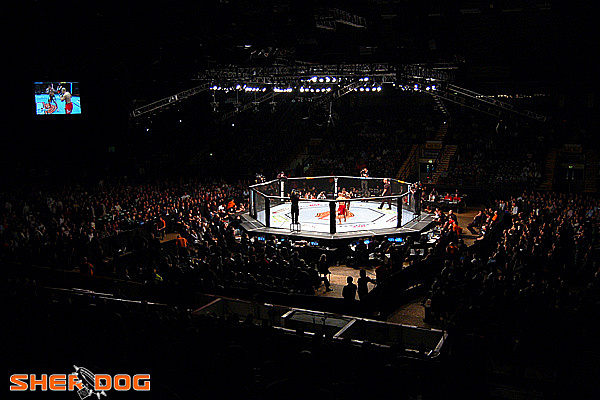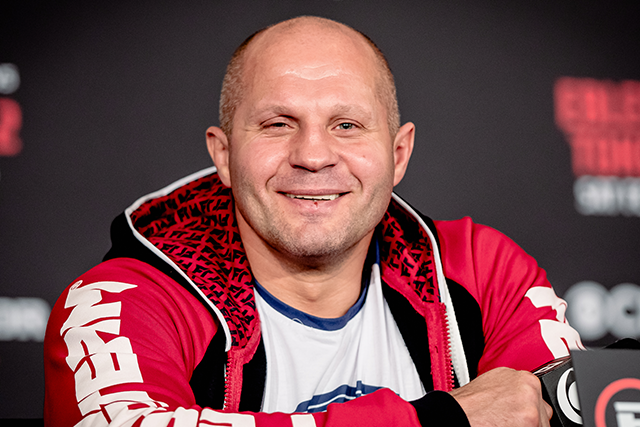The Zuffa Myth and the Auteur Theory of the UFC
Jake Rossen Aug 24, 2010

File photo: Sherdog.com
In a softball profile of Dana White for The Boston Herald, sportswriter Ron Borges falls hook and line for the same inexhaustible fairy tale that the UFC was held on barges and regularly featured groin biting before White and the Fertittas gallantly dragged it from the muck.
Advertisement
Does the UFC circulate a press kit with this fiction? Probably not: Enough reputable outlets have repeated it enough that Borges probably considered it accurate. But the UFC rules as we know them were more or less in place in New Jersey in 2000, well before White purchased the promotion.
Boston was home to White for years, and a little hyperbole isn’t so
bad. The bigger issue is the consistent portrayal of White as the
sole and exclusive engine behind the UFC’s success, to the point
where any and all history prior to 2001 is either revised or
eliminated.
In fairness to White, he had a good teacher. Bob Meyrowitz, who ran Semaphore Entertainment Group at the time ad man Art Davie and Rorion Gracie approached the business with the premise for the UFC, was not even in attendance for their first event in Denver. By the time the promotion was turning over hundreds of thousands of pay-per-view buys, Meyrowitz had purchased Davie and Gracie’s stake and turned himself into its sole creator. It made for a cleaner, better package, with the neat side effect of satiating Meyrowitz’s voluminous ego. Sound familiar?
White’s story as told through the uncritical lenses of media misses several key points: When a business officer has a near-bottomless well of financial resources to cover their slips, things get easier. Those slips came early and often: UFC 33 was a disaster simply because no one could get a time slot coordinated, as embarrassing an error as any the upstart promotions have managed; heavily oiled marketing campaigns featuring Carmen Electra looked like something you’d see in Out, which is a little too demo-specific; Chuck Liddell was lent out to Pride and smashed. It’s all rookie, bush-league stuff. The difference? Fertitta could cover the repair bill.
Also swept aside is the notion of Zuffa purchasing the UFC’s intellectual property when they could have easily started their own banner and saved a couple of million. The reason? Meyrowitz, despite his fumbles, turned the UFC into a highly recognizable brand: the UFC-as-Kleenex analogy started under his watch. For everything White has done, he was working with an incredible asset: eight years of brand placement. If Coca-Cola is hemorrhaging money and a new CEO is able to reverse their fortunes, it’s an impressive feat -- but it does not mean he invented Coca-Cola.
The UFC and MMA as we know it today is the product of many, many people: the Gracies, who popularized the idea of disparate styles meeting in Brazil; the boxers who would consent to fighting a wrestler sporadically throughout the 20th century; Bill Viola, who strapped headgear and pads on martial artists and let them punch and submit each other in Philadelphia at the height of the Toughman craze; Pat Jordan, who wrote a 1989 Playboy article on Rorion that brought Davie to his Academy; Davie and Rorion, who packaged it as a commercial property; SEG, which turned it into a viable television product; Joe Silva, who can make sense of the bigger picture in matchmaking; and White and the Fertittas, who used money and connections to make it digestible to the masses.
But that’s not a good sound bite, is it? It’s long and laborious and probably missing a few more steps.
Today, White is fond of statements like, “I built this thing.” And in many ways, he’s right: White figured out how to monetize a business that had the scarlet letter of political oppression and social irresponsibility seared into it. It’s a spectacular fourth-quarter comeback, and it’s impressive enough on its own. So why embellish it?








